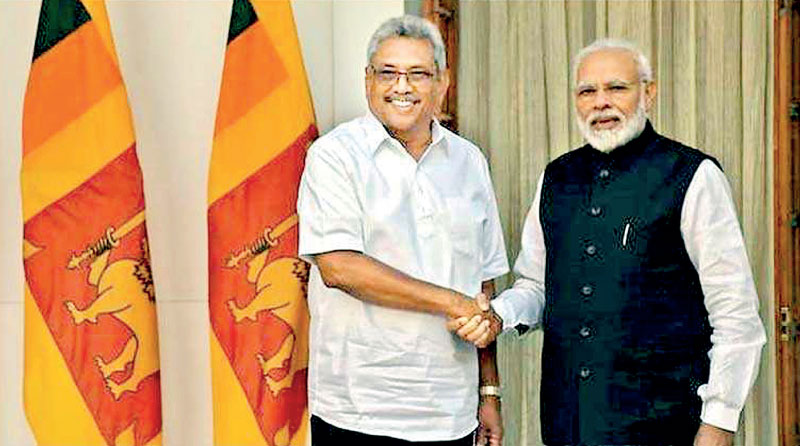Monday Feb 16, 2026
Monday Feb 16, 2026
Thursday, 21 October 2021 01:34 - - {{hitsCtrl.values.hits}}

First was the promise he made to Indian Prime Minister Modi, when he met him in New Delhi in 2019, to implement the 13th Amendment. As soon as Rajapaksa returned home, he retracted and said that the majority, by which he actually meant the supremacist minority, would not agree to it
|
 The 2021 Amnesty International Discrimination Report Sri Lanka (AIDRSL) is a damning account of the worsening discrimination against and suffering of Muslims under the present regime.
The 2021 Amnesty International Discrimination Report Sri Lanka (AIDRSL) is a damning account of the worsening discrimination against and suffering of Muslims under the present regime.
“While anti-Muslim sentiment in Sri Lanka is nothing new,” it notes, “the situation has regressed sharply in recent years. Incidents of violence against Muslims committed with the tacit approval of the authorities have occurred with alarming frequency. This has been accompanied by the adoption by the current Government of rhetoric and policies that have been openly hostile to Muslims.”
As far as the regime is concerned, there is nothing new in this report, because even other organisations such as UNHCR, Organization of Islamic Cooperation (OIC) and European Union have made similar observations and warned the regime of damaging consequences. Therefore, on the face of it, AIDRSL is just another usual lament and accusations that could be ignored or dismissed by policymakers.
However, that report, as part of a growing family of similar publications, including Shreen Saroor’s ‘Muslims in Post-War Sri Lanka: Repression, Resistance and Reform (2021)’, has enriched the store of evidence that international organisations have accumulated to bring pressure upon State and non-State establishments to take practical measures to make Rajapaksa regime realise that it needs to change its ways and approach towards minority rights and liberties.
Anti-Muslim violence is only one part of the whole history of destroying the political power and economic role of minorities. Given the parlous state of Sri Lanka’s economy in which everyone but the nouveau riche suffers, external pressure through economic measures would certainly send a strong message to the obdurate rulers. A growing multi-ethnic Sri Lankan diaspora would also be working hard to add its own pressure upon the international community for effective action.
Given the weakness of Opposition parties and the double game played by some of them in supporting the regime through backdoor while shouting against it in the open, and the deepening militarisation of public space to prevent any mass uprising, it is the international community that can effect changes to the prevailing situation. It is in that context AIDRSL makes a contribution and serves a purpose.
It is not only Muslims who are suffering at the moment, although indiscriminate victimisation of that community has driven its members live in a state of constant fear and threat, which in turn has crippled their economic activities and contribution to GDP, but also every ordinary family in Sri Lanka is undergoing a life of misery, helplessness and trauma.
The regime is conveniently shifting the blame to the pandemic, but it is the rulers’ authoritarianism, corruption, patrimonialism and whimsical policies that lie at the core of this disaster. Two years of gross mismanagement of the economy with policies on the run, arising mostly from President Gotabaya Rajapaksa’s thought bubbles and sanctioned by his Viyath Maga, had caused so much hardship and misery that even those who brought this regime to power are now coming out in protest, which has forced him to shout Mea Culpa.
In spite of this disaster, there is no sign of softening the regime’s total commitment to uphold its underlying ideology of Sinhala-Buddhist majoritarianism, an ideology manufactured by a group of Buddhist chauvinists in the past, who, in the wake of decolonisation rejected the idea of a multi-ethnic and multi-cultural polity and endeavoured to create in future a homogenous Sinhala Buddhist State.
False promises
To them therefore, every minority in the country was an alien and an enemy to fight against. Their battle started with the disenfranchisement of Plantation Tamils in 1949, and is being continued at present by their current avatars against Muslims. In between, of course, the Tamil community faced decades of humiliation, discrimination, deprivation and military massacre.
That still remains an unfinished business to the majoritarian soldiers. How hard it is for the current regime to relinquish this ideology and opt for a more pragmatic form of politics within a democratic framework could be seen from three instances where President Gotabaya Rajapaksa had made it clear that he would not compromise his commitment to majoritarian rule.
First was the promise he made to Indian Prime Minister Modi, when he met him in New Delhi in 2019, to implement the 13th Amendment. As soon as Rajapaksa returned home, he retracted and said that the majority, by which he actually meant the supremacist minority, would not agree to it. It was in that vein he also declared that what the people in the North wanted was not power devolution but economic development.
Second was the invitation he sent to TNA leaders for a dialogue regarding Tamil issues. That invitation was withdrawn on the very next day, apparently because of revolt from the same minority. There were again rumours floating around later that the dialogue would restart when the SLPP strategist Basil Rajapaksa returned from his trip to the US. Nothing eventuated so far.
And the third was again a promise, and this time it was made to the UN Secretary General Antonio Guterres in New York, where he declared his willingness to meet members of the Tamil diaspora to resolve the Tamil issue.
His Foreign Minister is now hedging around that promise and maintains that the Government would not hold talks with banned Tamil organisations and their leaders. In fact, almost all Tamil diaspora organisations have been banned by this regime. Who does it want to talk with then?
Given this underlying intransigence there is no hope that this regime would change its policy towards Muslims. The community would continue to suffer in the hands of majoritarian supremacists unless outside pressures compel this regime to allow minorities preserve their cultural identity while remaining patriotic.
This is not to condemn the Sinhala Buddhists as a community of ethno-centrists and racists. That community is historically known for its compassion and tolerance. The millennium old coexistence of Sri Lankan Muslims is more than enough to vouch for this fact.
But unfortunately, this community had been subjected to perennial propaganda by ethno-centrist politicians and their supremacist ideologies that made it believe that Buddhist population and Buddhism are under threat from alien minorities like Muslims.
This is the fundamental reason why Muslims are experiencing an existential threat at present. These supremacists by promising the nation, “vistas of prosperity and splendour”, has brought instead nothing but misery, communal discord and international shame.
AIDRSL would certainly add more weight especially to OIC which recently passed a resolution against Rajapaksa regime regarding its treatment of Muslims.
“The Sri Lankan authorities must break this alarming trend,” urges the report, “and uphold their duty to protect Muslims from further attacks, hold perpetrators accountable and end to the use of government policies to target, harass and discriminate against the Muslim community.” It is up to OIC to urge its member countries to express their concern by action and not words.
(The writer is from the School of Business and Governance at Murdoch University, Western Australia.)